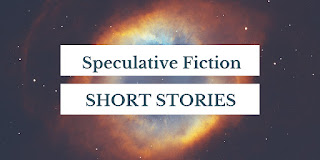Another month gone by, another leap into the wealth of excellent speculative short fiction available online. There are so many wonderful websites and zines that publish short fiction these days: support the ones you like. Subscribe, use Patreon, buy single issues… it makes a difference to the sites and zines, and it makes a difference for the writers, too.
Here we go: 11 wondrous speculative fiction stories I read this past month.
Man of the House, by Pamela Ferguson in Daily Science Fiction. “Our man is not producing any energy. There is no electricity to power the house. Nothing works.” This is a fabulous short-short story that is so deceptively simple in its construction, and so completely brilliant. If you want to read a story that demonstrates how you can completely twist a story sideways with one sentence (I actually gasped), then this story is for you.
So Normal and Unwritten, by Karen Bovenmyer in IronSoap. “An empty house lived at the end of his street.” This story of a haunted life and a haunted house is beautifully rich and evocative, and it’s the kind of story that worms its way deep inside you. Bovenmyer manages to tell the story, convey a mood, and create a place, with few words but a lot of skill. Terrific soul-piercing horror in one paragraph.
One-Quarter Dreaming, Three-Quarters Want, by Helen Marshall in Liminal Stories. “You waved your hands, and you stamped your feet, and inside you felt a shudder growling and growling inside you.” This story is gut-wrenching because of all the emotions it explores and evokes, and it is also exquisitely crafted: the language has a poetic gracefulness that is a joy to read. Marshall creates a world and a family that feels vividly real (with all the obvious and less obvious magic stitched into the tale). A fantasy gem.
Late Nights, He Comes, by Armel Dagorn in Liminal Stories. “She’d reached the lake now, could see the water lap up the reedy shore. It looked like something a monster would come slithering right out of.” This story moves through both time and space, exploring a dark and ominous landscape that is weighed down by its own past, its own evils, dangers, and ghosts. Two different timelines run through that landscape, and Dagorn weaves it all together masterfully into an unsettling and poignant tale.
John Wagner’s Last Blues, by Andrew Gilstrap at Mythic Delirium. “He wrestled lullabies from his guitar and then snapped lyrics out like the crack of a whip.” This story hits that often elusive sweet spot between heartwarming (and heartbreaking) sentimentality on one side, and magic-infused reality on the other. It’s a fabulous ghost story that manages to say a whole lot about life, music, and death. A wonderful read that brought tears to my eyes by the end.
The Invisible Stars, by Ryan Row in Shimmer. “It was cold, and the delicate streetlights made him want to shiver and click his mandibles in appreciation.” A completely original take on the “alien stuck on Earth” theme, this story is imbued with such a sense of sadness and longing and loneliness that it made me shiver as I read it. Row’s prose has a melody and sharpness to it that really makes this story special.
What Becomes of the Third-Hearted, by A. Merc Rustad in Shimmer. “The sand has turned to glass and my heels crack the shore in tiny percussions like the breaking of my hearts.” With language that blends prose and poetry, Rustad’s story feels like both a story and a half-remembered dream – existing somewhere in that place between waking and sleeping. One of the most original stories I’ve read about the end of the world.
Damnatio Ad Beastias, by Kristi DeMeester in Apex Magazine. “But it had never been the need for blood that changed her into something monstrous. Had never been the drive to hunt that made her spine arch and crack…” A monster-tale. A tale about self-medication, about addiction, about loneliness, about transformation. DeMeester’s uniquely imagined world is full of fear and pain and longing. I love the way she does not spell out every detail of backstory here, but still manages to pull you in, and make you understand and empathize with the troubled protagonist, and also feel as though you’ve stepped into her life and world.
Rabbit Heart, by Alyssa Wong in Fireside Fiction. “I am not God. I cannot bring back the dead. But I can give them the next best thing.” Wong writes an evocative and darkly beautiful and disturbing tale that puts a new twist on tropes like cloning and bringing the dead back to life. It’s achingly beautiful and terse, and perfectly conveys the madness that can lurk just beneath our grief and loss.
See The Unseeable, Know The Unknowable, by Maria Dahvana Headley in Lightspeed.”She spins slowly, trying to see, but there’s nothing to be seen.
We are the ones above her.
We know better than to be visible, not at this point.”
This story knocked me for such a loop that I hardly know what to say about it, except that it’s magical, wonderful, dark and twisted, and absolutely enchanting. There is a forest, there are lights in the forest, there is a woman, and there is a cat. Dahvana’s irresistible prose has a wonderful, mesmerizing cadence and rhythm that mesmerizes from the first sentence to the last.
The House That Creaks, by Elaine Cueygkeng in The Dark. “Do you see my chrysalis, covered in dust and particles, by spider webs whose weavers were innocent of its malevolence?” Deeply unsettling and painfully terrifying, this story blends the supernatural horrors of a haunted house with the much-too-real horror of an oppressive regime that thinks nothing of torturing its citizens. Cueygkeng keeps twisting reality and terror ever tighter, ever darker, making for a truly bone-chilling read.
(Originally published at mariahaskins.com)

No comments:
Post a Comment